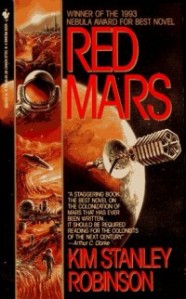 What happens when you take the best and brightest of Earth’s biologists, engineers, computer scientists and geologists, and coop them up in a tiny habitat on Mars together? They begin to hate each other with a passion, that’s what.
What happens when you take the best and brightest of Earth’s biologists, engineers, computer scientists and geologists, and coop them up in a tiny habitat on Mars together? They begin to hate each other with a passion, that’s what.
Red Mars is a fascinating study of what happens to society when we decide it’s time to colonize Mars. The science of the book is rock-hard. The first one hundred colonists make their agonizingly slower-than-light journey out to the red planet, and Robinson seems to have done his homework on every other aspect of the colonies: from physics to biotechnology to sociology. And yet against the backdrop of all this plausible science, the story is character-driven.
Each of the first one hundred colonists who we get to meet has a unique character. Maya Toitovna, leader of the Russian delegation of colonists, is a twit. And yet, when times get tough, she gets tough, too. John Boone is pretty much Buzz Lightyear, charismatic and arrogant. Nadia Cherneshevsky is the badass engineer who solves problems. And Frank Chalmers: oof. The chapters that take place inside Frank’s head are some of the creepiest parts of the novel. Never have I seen a man so pathologically out of touch with himself.
Each of these early colonists is witness to an epic span of time as Mars fills with people, political unrest and finally insurrection begins. The end of Red Mars is not the end of the story (it’s part of a trilogy) and I fully intend to read the rest.
P.S. Though most of the science in this book is excellent, there is one mistake that I found quite amusing. In Kim Stanley Robinson’s 2026, the Internet is a very boring place. It’s a handful of message boards that scientists sometimes use to share data. Nobody thinks of using it for mass media purposes when politics get rough or even to sabotage it. This in a world that has AI’s and omegendorph, a wonder drug. Still, the book was written in 1993, so you have to give Robinson credit for even imagining that we will use the Internet in the future.
